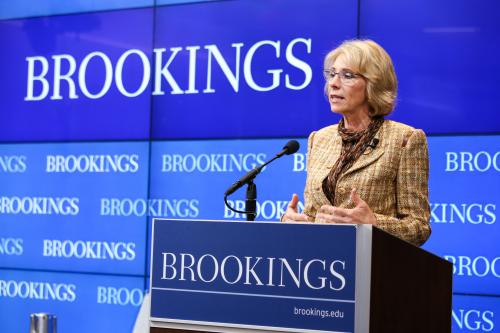In 2013 the Obama administration broke new ground when it released its College Scorecard initiative, which for the first time gave students and their families something lacking in most traditional college rankings: a way to compare colleges based on the economic performance of their students. In recent months we have seen different iterations of “value-added” college rankings, one version from The Economist and one from Brookings’s own Metropolitan Policy Fellow Jonathan Rothwell.
The Urban Institute’s Matt Chingos and Kristin Blagg agree that these new rankings are a step in the right direction and are more informative than other, un-adjusted ranking systems, but argue that there’s still room for improvement, namely when it comes to what types of data are collected, and how they are separated.
Chingos and Blagg explored these potential improvements in a recent report in the Brookings Economic Studies Evidence Speaks series. Citing wide variances between the new value-added rankings based on Scorecard data released by Rothwell and The Economist, they noted that many of the discrepancies are tied to the fact that all of the earnings data for pre- and post-college students are lumped together.
Imagine this common scenario: One 18-year old student enrolls in college as a dependent, reporting her parent’s income on her taxes. Then upon graduating, files as an independent, with a substantially lower income than she did only a few years earlier.
Another 24-year old student enrolls in college reporting as an independent, and makes a modest salary. Upon graduating, that student reports a somewhat increased salary as a result of her college degree.
It’s not hard to imagine how these different reporting scenarios could easily skew data in one way or another. In order to account for this, Chingos and Blagg suggested changing the way data is collected so that information about independent and dependent students is separated. According to the researchers, these data, which already exist from IRS and FAFSA records, would allow for a more complete and more useful set of college rankings for prospective students and their families.
Read their full report here, and learn more about new data-driven college rankings in a recent podcast featuring Metropolitan Policy Program Fellow Jonathan Rothwell.








Commentary
Obama’s College Scorecard is a step in the right direction, but better data would improve it
March 28, 2016